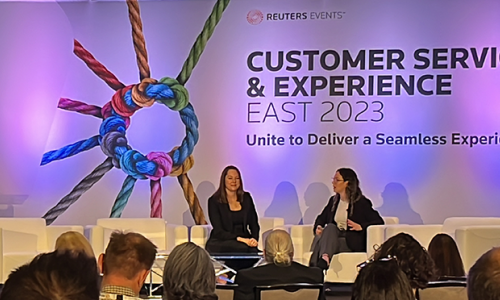AI’s popularity has exploded recently, but many brands have been using it for years, to varying degrees, to gain customer insights, make employees’ jobs easier, and improve customer interactions.
The potential upside to businesses seems extremely promising, not only as it pertains to customer experience (CX) but from a bottom-line perspective, too. Most companies (64%) believe AI will help increase their overall productivity and 42% think it will streamline job processes, according to research compiled by Forbes.
Customer Strategist Journal asked business leaders how they’re using AI today, and where they see its capabilities heading in the future. Brands across various sectors were eager to share their perspectives.
AI in customer experience powers faster, easier interactions
One of AI’s greatest assets is its speed, and companies are taking advantage of its ability to quicken interactions and comb through huge amounts of data with ease. From chatbots to customized communications, AI is helping customers get the answers and information they’re looking for more quickly.
“AI-powered chatbots enable us to offer immediate support, addressing common queries and concerns,” said Martina Genao, director of operations at Emergency Plumbing Squad, which operates sites throughout the United States.
The company also uses AI analytics to gather and analyze customer data so it can better understand and meet customers’ needs and preferences.
“This helps us tailor our services accordingly, leading to improved customer satisfaction,” Genao said. “By leveraging AI, we continually strive to enhance the overall experience for our customers and provide them with top-notch plumbing services.”
Several retailers said they’re also using AI to make interacting with their brands easier and faster. At fashion retailers iHeartRaves and Into the AM, for instance, AI-driven search results make it easier for customers to shop their vast websites and keeps tabs on what they buy, according to Brandon Chopp, digital manager of the brands.
“Customers can easily scour through our online collection by typing in keywords and get a list of products that best match their query,” he said. “Similarly, AI technology helps us to make sure our customers can access their order history, track package delivery status, manage returns, and keep up to date with promotional offers they would be interested in.”
Online home goods retailer Heftyberry uses AI-powered tools to send personalized follow-up communications, reminders, or recommendations based on customer behavior or purchase history – all of which makes for a better customer experience, said founder Ilia Mundut. Automating those processes “streamlines the CX process, saves our customers and team time, and allows us to focus on providing higher-value interactions,” Mundut added.
At retailer Survival Gear Shack, delegating basic customer inquiries to AI-powered chatbots frees human associates up to focus on more-complex issues.
“This enables faster response times and round-the-clock support, enhancing the overall customer experience,” said founder and CEO Max Shak. The company’s also using AI to help generate relevant content for its customers – things like blog articles, product descriptions, user guides and social media posts. Being able to consistently deliver valuable content helps engage customers and improve their overall experience, Shak said.
But for all AI’s potential to speed up customer interactions, Mundut noted it’s important to retain human element in CX, too.
“We ensure that AI-powered messaging is designed to complement human interactions, not replace them,” Mundut said. “Human customer service representatives are still available to handle more complex inquiries, provide empathy, and build genuine relationships with our customers. By striking the right balance between AI and human interaction, we create a CX that is efficient, engaging, and personalized.”
CX gets more proactive with AI
Today’s consumers don’t just want you to meet their needs when they arise; they expect you to predict what they’ll want next and be ready with personalized recommendations. AI’s ability to quickly analyze customer preferences and purchase histories helps brands craft a more proactive CX approach.
“The capacity of AI to evaluate user activity and find useful trends is a significant plus,” said Arnaud McMahon, chief marketing officer of Sun Valley Saunas. “Using AI algorithms helps us learn more about our client's wants, needs, and habits. This helps us see trends and learn helpful information to improve our marketing strategies.”
AI’s also made the company more proactive, McMahon added: “AI-driven systems can keep a constant eye out for issues by tracking user actions in real-time. By anticipating problems, we can swiftly implement solutions and guarantee a positive customer experience.”
City Unscripted, an online site that connects travelers with hosts in various cities worldwide to arrange private tours and curated tourism experiences, uses AI’s proactive capabilities to anticipate customers’ needs and grow loyalty.
“Thanks to developments in AI and machine learning, we can now foresee and correct problems that could otherwise cause customers to defect,” said founder and CEO Nick Whitfield. “Artificial intelligence systems can sift through mountains of data to find patterns and solve problems in the consumer experience. We may stop guessing and start basing our judgments and priorities on hard evidence.”
Uninstall tracking, for instance, helps the company collect data on customers who stop using the site and transforms that churn into actionable intelligence that City Unscripted can use to inform its customer retention efforts, he said.
“AI has great potential to help us keep more of our existing clients. It allows us to be more sensitive to our customers' needs and to take an active role in solving their problems,” he said. “We can anticipate our customers' needs, provide them with unique answers, and provide a better service overall. As a result, we are better equipped to keep our current clients and develop tactics to bring back any who may have defected.”
AI enables more personalized journeys
With all the data AI puts at your fingertips, brands gain a deeper understanding of their customers, which enables them to provide the type of highly personalized experiences customers expect.
Chopp said iHeartRaves and Into the AM use AI to give customers tailored recommendations based on their unique search habits, as well as product images and sizing charts tailored to their individual preferences. They use those customized results to populate a section of their sites titled, “These Are So U.”
Survival Gear Shack also uses AI to make the customer journey more personal, Shak said, employing AI language models to generate customized communication with customers. “Whether it's through chatbots, automated email responses, or tailored content, the ability to provide relevant and customized information can significantly improve CX,” he said.
AI’s also powering more personalized experiences at U.K.-based online flower delivery company Flower Station, where it’s used to provide more immediate and individualized customer support, said CEO David Cohen. With AI algorithms analyzing customer preferences and behavior, the company can offer bespoke product recommendations, promotions, and discounts, he said.
AI adoption requires a thoughtful strategy
For all its amazing benefits, AI also carries some risks – especially since its full power, scope, and potential remain unclear. Brands need to carefully consider how comfortable they (and their customers) are with AI increasingly intervening in the brand-customer relationship.
Yeespy, an app that lets parents monitor their children’s online activity, is excited about AI’s potential but keeping security top of mind, according to CEO Peter Michaels.
Like many companies, Yeespy uses AI to make the most of data analytics and personalize CX. But AI needs to be deployed “in a responsible and ethical manner,” said Michaels.
“Looking ahead, we plan to invest in AI research and development to further refine our offerings,” he said. “Our goal is to leverage AI technologies to enhance data privacy, improve personalization, and provide seamless customer experiences. We aim to accomplish this by developing AI solutions that empower customers, respecting their privacy while delivering valuable insights and assistance.”
While the future trajectory of AI remains to be seen, companies across various industries are excited to see what opportunities (and challenges) it will bring to generate and analyze data, automate the customer journey where it makes sense, and elevate customer and employee experience.






